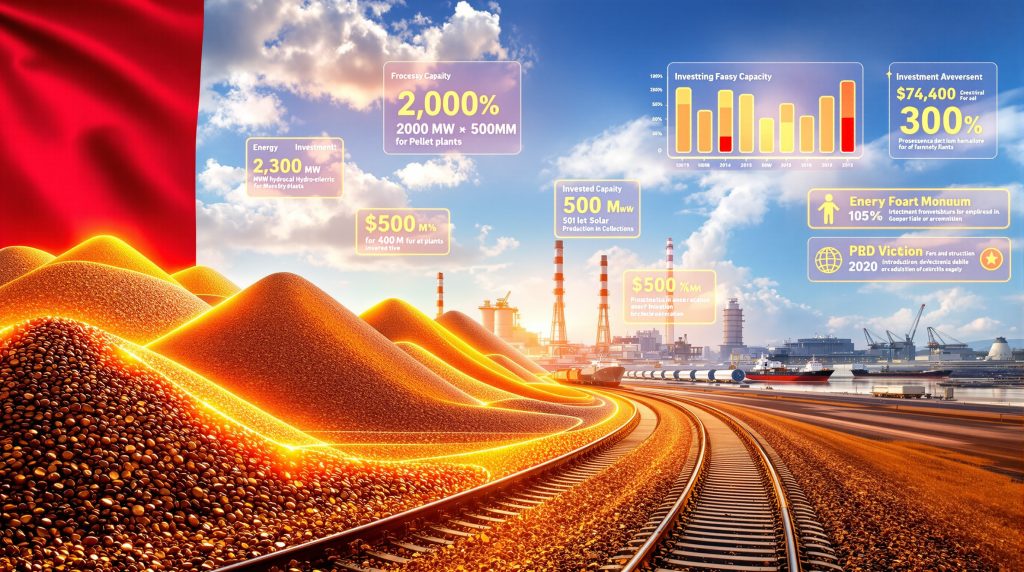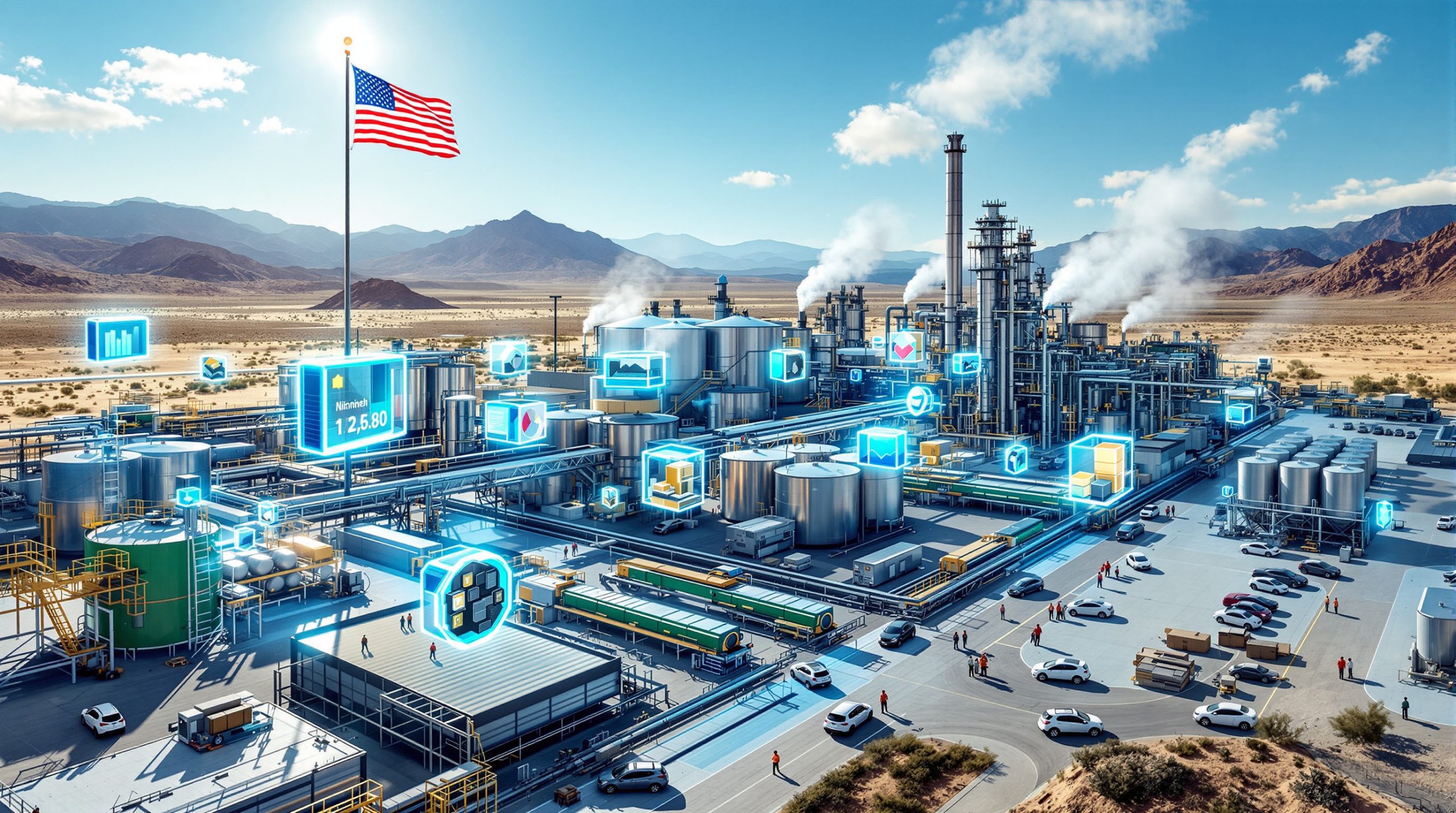Understanding Guinea's Iron Ore Processing Revolution
Guinea's transformation from a raw material exporter to an integrated mineral processing hub represents one of Africa's most ambitious industrial development initiatives. The West African nation, which currently ships approximately 60% of its bauxite production to China, is implementing sweeping policy changes designed to capture significantly higher value from its vast mineral resources through domestic processing capabilities. This Guinea iron ore processing initiative addresses a fundamental economic inefficiency that has persisted since colonial times.
As Guinea's Mines Minister Bouna Sylla emphasized in November 2025, the country remains the world's largest bauxite producer yet operates zero alumina refineries domestically. This paradox has cost Guinea billions in potential export revenues while limiting industrial job creation and economic diversification opportunities.
The timing of this processing revolution coincides with the November 2025 commencement of iron ore shipments from the massive Simandou deposit, creating unprecedented leverage for the government to enforce processing requirements on international mining operators. This convergence of bauxite dominance and iron ore demand trends positions Guinea to become a regional processing powerhouse within the next decade.
Economic Drivers Behind Processing Initiatives
The financial incentives driving Guinea's processing transformation are substantial. Raw bauxite exports generate minimal economic returns compared to processed alumina, which commands premium pricing in international markets. Similarly, pelletized iron ore products typically achieve higher valuations than raw ore, though specific premium percentages vary based on quality specifications and market conditions.
Guinea's bauxite resources offer particular advantages for processing development. The country's low-silica bauxite deposits, which underpin approximately 25% of global aluminum production, are ideally suited for low-temperature refining processes. This geological advantage reduces energy requirements and operational costs compared to processing higher-silica bauxite varieties found in other regions.
Furthermore, mineral beneficiation insights from other African nations demonstrate the transformative potential of local processing. World Bank analysis from July 2025 indicated that in-country alumina and iron ore processing could fundamentally transform Guinea's economy by creating industrial employment opportunities and reducing exposure to commodity price volatility.
Strategic Timeline for Industrial Development
Guinea's processing development follows an accelerated implementation schedule designed to establish multiple operational facilities by 2030. The first alumina refinery, constructed through partnership with China's State Power Investment Corporation (SPIC), targets completion by end-2027 with construction already underway.
The government has established specific deadlines for iron ore processing commitments tied to the Simandou project launch. Rio Tinto and the Winning Consortium Simandou must submit feasibility studies for either a 500,000-ton steel plant or 2-million-ton pellet facility within two years of first exports, establishing a November 2027 compliance deadline.
Advanced negotiations are progressing simultaneously with multiple international partners. Discussions with Chinalco for additional alumina capacity have reached advanced stages, while ongoing talks with France's Alteo, Compagnie des Bauxites de Guinee, and Alcoa indicate broad international interest in Guinea's processing opportunities.
What Makes Guinea's Iron Ore Processing Initiative Unique?
Guinea's approach differs fundamentally from traditional mineral processing development models through its comprehensive integration across multiple commodities and mandatory contractual enforcement mechanisms. Rather than sequential development of individual processing facilities, the government is implementing coordinated industrial transformation that leverages existing infrastructure investments while creating synergies between bauxite and iron ore processing operations.
Integrated Infrastructure Development
The processing initiative builds upon substantial infrastructure investments already committed for the Simandou iron ore project. The new railway system and deep-water port facilities provide integrated transportation networks that support multiple commodity processing without requiring standalone infrastructure development for each facility.
This integrated approach reduces capital costs significantly compared to traditional processing ventures that must develop dedicated transportation and export infrastructure. Processing facilities can share port facilities, railway capacity, and supporting services, creating economies of scale that improve project economics and accelerate development timelines.
The coordination between transportation infrastructure and processing development also enables just-in-time delivery systems for international customers while minimizing storage requirements and associated costs. This operational efficiency provides competitive advantages over processing facilities in regions with less integrated infrastructure systems.
Technology Transfer Requirements
Guinea's processing agreements incorporate mandatory technology transfer provisions that distinguish these partnerships from conventional extraction arrangements. International operators must provide technical training for Guinean workers and establish local capacity building programs as contractual obligations rather than voluntary corporate social responsibility initiatives.
These requirements ensure that processing development creates lasting technical capabilities within Guinea's workforce. The emphasis on knowledge transfer addresses historical patterns where foreign mining operations provided limited skills development for local personnel, creating sustainable employment opportunities beyond the initial construction phases.
The enforcement mechanism for these requirements demonstrates government commitment to capacity building. The August 2025 revocation of Emirates Global Aluminium's bauxite concession for failing to develop a promised alumina refinery establishes credible enforcement precedent for processing obligations.
Key Players Driving Guinea's Processing Transformation
Chinese State-Owned Enterprises Leading Investment
China's State Power Investment Corporation has committed to constructing Guinea's first modern alumina refinery with completion targeted for end-2027. This partnership reflects China's strategic approach to securing upstream processing capabilities in key supplier countries while supporting Guinea's industrialization objectives.
Chinalco represents another significant Chinese partner with advanced negotiations underway for additional processing plants. These Chinese state-owned enterprises bring substantial capital resources, technical expertise, and established market access for processed products, providing critical elements for successful facility development.
The Chinese involvement extends beyond financial investment to include operational expertise and market integration. Given that approximately one-third of iron ore produced by Simandou is destined for Chinese mills, these processing partnerships create vertically integrated supply chains that enhance project economics and long-term viability.
International Mining Giants' Commitments
Rio Tinto faces contractual obligations to establish processing capabilities as part of its Simandou development agreement. The company's spokesperson confirmed that Simfer venture has committed to conducting feasibility studies on pellet plant development to evaluate viability and available options.
The Winning Consortium Simandou operates under identical processing requirements, with both operators facing November 2027 deadlines for feasibility study submission. If either operator fails to meet these requirements, Guinea can commission independent feasibility studies at the expense of Compagnie du Transguineen, the joint venture managing Simandou's rail and port services.
This enforcement mechanism creates financial penalties for non-compliance while ensuring processing studies proceed regardless of operator cooperation. The contractual structure demonstrates Guinea's leverage in securing processing commitments from major international mining companies.
European and American Companies Exploring Opportunities
France's Alteo has entered advanced discussions for additional processing facilities, indicating European interest in Guinea's processing potential beyond Chinese partnerships. These negotiations suggest diversified international participation that could provide technology alternatives and market access to multiple regions.
American aluminum producer Alcoa maintains ongoing discussions for processing opportunities, representing potential United States investment in Guinea's industrial development. This participation would provide additional geographic diversification and potentially support alternative financing arrangements through U.S. development finance institutions.
The involvement of companies from multiple countries creates competitive dynamics that benefit Guinea through enhanced negotiating leverage and technology options. This diversified approach reduces dependence on any single country or company for processing development success.
How Will Iron Ore Processing Transform Guinea's Economy?
Employment Generation Across Skill Levels
Processing facilities create diverse employment opportunities spanning technical operations, maintenance specializations, logistics coordination, and quality control analysis. These positions typically offer higher compensation levels and enhanced career advancement potential compared to traditional mining employment focused on extraction activities.
The skills required for processing operations include technical training in refinery operations, quality assurance protocols, and specialized maintenance procedures. This employment profile creates opportunities for Guinean workers to develop transferable technical skills applicable across industrial sectors, supporting broader economic diversification beyond mining activities.
Processing employment extends beyond direct facility operations to include supporting services such as equipment maintenance, specialized logistics, and technical consulting. This multiplier effect generates additional employment opportunities throughout the regional economy while creating sustainable industrial capacity.
Foreign Exchange Earnings Optimization
Processed iron ore products generate substantially higher export revenues per ton compared to raw ore shipments, improving Guinea's trade balance and reducing vulnerability to commodity price fluctuations. The value addition from processing creates more stable revenue streams less susceptible to short-term price volatility.
The government's processing strategy targets premium market segments including direct reduced iron production for green steel applications. These specialized products command higher pricing than standard pellets while supporting environmental sustainability initiatives in international steel production.
Enhanced export revenues from processing contribute to foreign exchange stability and support broader economic development initiatives. The increased government revenues from processing taxes and royalties provide funding for infrastructure development and social programs beyond the mining sector.
Industrial Ecosystem Development
Processing plants catalyze supporting industries including specialized equipment maintenance, technical services, and industrial supply chains. This ecosystem development extends economic benefits beyond direct processing operations while creating business opportunities for local enterprises.
The industrial cluster effects from processing development attract additional manufacturing investments that leverage shared infrastructure and skilled workforce availability. These secondary investments compound the economic impact of initial processing facilities while diversifying the industrial base.
Service sector development supports processing operations through specialized logistics, technical consulting, and equipment supply services. This supporting ecosystem creates employment opportunities across skill levels while establishing Guinea as a regional industrial service center.
Technical Requirements for Iron Ore Processing Success
Energy Infrastructure Challenges
Iron ore pelletizing requires substantial energy inputs, presenting Guinea's most significant processing challenge. The government is pursuing diversified energy investments to ensure adequate power supply for industrial operations while maintaining competitive energy costs.
| Energy Source | Capacity Target | Timeline | Primary Application |
|---|---|---|---|
| Hydroelectric | 2,000 MW | 2026-2028 | Base load industrial power |
| Solar | 500 MW | 2025-2027 | Peak demand management |
| LNG Plants | 1,500 MW | 2027-2030 | Dedicated processing power |
The energy development strategy emphasizes renewable sources supplemented by natural gas capacity to ensure reliable industrial power supply. Hydroelectric development provides base load capacity while solar installations address peak demand periods and reduce overall energy costs.
A U.S.-backed plan to import liquefied natural gas for dedicated power plants addresses immediate energy requirements for processing facilities while longer-term renewable capacity comes online. This diversified approach reduces energy security risks and supports competitive industrial electricity pricing.
Quality Control and Certification Systems
International steel producers require consistent ore quality and environmental certifications for pelletized products. Guinea is establishing comprehensive testing laboratories and quality assurance protocols to meet these stringent international requirements and support premium product pricing.
Quality control systems must verify iron content, impurity levels, and physical characteristics that meet specific customer requirements. These technical capabilities require specialized equipment and trained personnel to ensure consistent product quality that commands premium pricing in international markets.
Environmental certification requirements reflect increasing focus on sustainable steel production and emissions reduction. Guinea's processing facilities must demonstrate compliance with international environmental standards to access premium market segments focused on green steel production.
Transportation and Logistics Optimization
Processing facilities must coordinate effectively with port operations and railway scheduling to ensure efficient product movement and minimize storage costs. The integrated transportation system enables optimized delivery schedules that reduce inventory requirements while meeting customer delivery commitments.
Logistics optimization requires sophisticated coordination between processing operations, transportation scheduling, and customer delivery requirements. This operational complexity demands specialized logistics expertise and information systems to manage multiple product streams and delivery schedules efficiently.
Port facility utilization must balance raw material imports, processed product exports, and facility maintenance requirements. Effective scheduling maximizes infrastructure utilization while ensuring adequate capacity for projected processing volumes and export commitments.
Environmental Implications of Processing Development
Emissions Reduction Through Local Processing
Domestic processing eliminates transportation emissions associated with shipping raw ore to distant refineries while incorporating cleaner production technologies compared to older international facilities. This emissions reduction supports global steel industry sustainability initiatives while providing competitive advantages for Guinea's processed products.
Modern processing facilities incorporate advanced emission control technologies and energy efficiency improvements that reduce environmental impact per ton of processed product. These technical improvements support Guinea's participation in green steel supply chains while meeting increasingly stringent environmental regulations.
Local processing reduces total supply chain emissions by eliminating intercontinental shipping of raw materials while enabling renewable energy utilization for processing operations. This environmental profile enhances market access for customers focused on supply chain sustainability.
Water Management and Conservation
Iron ore processing requires significant water resources for pelletizing operations and facility cooling systems. Guinea is implementing closed-loop water systems and advanced treatment facilities to minimize environmental impact while ensuring sustainable water resource management.
Water conservation technologies include recycling systems that minimize freshwater consumption and reduce discharge volumes. These systems incorporate advanced filtration and treatment capabilities that enable water reuse while meeting environmental discharge standards.
Sustainable water management addresses both operational requirements and environmental protection objectives. The integration of water conservation systems ensures long-term operational sustainability while supporting community water resource protection.
Waste Management and Circular Economy Principles
Processing facilities generate different waste streams compared to raw ore extraction, requiring specialized management approaches tailored to refinery and pelletizing operations. Guinea is developing comprehensive waste management policies that promote recycling and beneficial reuse of processing byproducts.
Circular economy principles guide waste management strategies that identify valuable applications for processing waste streams. These approaches reduce disposal requirements while creating additional revenue opportunities through byproduct sales and material recovery.
Waste management systems incorporate advanced technologies for material separation, treatment, and beneficial reuse. This comprehensive approach minimizes environmental impact while supporting sustainable processing operations and community environmental protection.
Market Positioning and Competitive Advantages
Geographic Proximity to Key Markets
Guinea's Atlantic coast location provides shorter shipping distances to European and North American steel producers compared to traditional suppliers in Australia and Brazil. This geographic advantage reduces transportation costs and delivery times for processed products while supporting customer inventory optimization.
The logistics advantages extend beyond shipping distances to include access to multiple port facilities and shipping routes. This geographic positioning provides supply chain flexibility and reliability that enhances customer relationships while reducing delivery risks associated with longer transportation routes.
Proximity to key markets enables responsive customer service and technical support that strengthens commercial relationships. The reduced transportation time facilitates closer cooperation with steel producers on product specifications and quality requirements.
High-Grade Ore Quality for Premium Products
Simandou's 65-68% iron content enables production of superior pellets that command premium pricing in markets focused on emissions reduction and steel quality improvements. This ore quality advantage supports higher profit margins for processing operations while meeting specialized customer requirements.
High-grade ore quality reduces processing costs and energy requirements compared to lower-grade alternatives, improving operational economics and environmental performance. These advantages support competitive positioning in premium market segments while enabling sustainable processing operations.
Superior ore quality enables specialized product development for high-performance steel applications and green steel production. These premium market opportunities provide enhanced revenue potential and long-term customer relationships based on technical performance rather than commodity pricing.
Diversified Customer Base Development
Processing capabilities enable Guinea to serve multiple market segments from traditional steel producers to emerging green steel manufacturers requiring specialized pellet specifications. This diversification reduces dependence on any single customer or market while providing enhanced revenue stability.
Market diversification strategies target different geographic regions and steel production technologies to optimize revenue opportunities and reduce market concentration risks. This approach ensures processing capacity utilization across varying market conditions while building sustainable customer relationships.
Customer development initiatives focus on long-term supply agreements that provide revenue stability while supporting processing facility financing and expansion planning. These partnerships create mutual benefits through supply security and technical collaboration.
Investment Requirements and Financing Strategies
Capital Investment Breakdown
Iron ore processing facilities require substantial upfront investments with pellet plants typically requiring $200-400 million depending on capacity specifications and technology requirements. These capital requirements reflect sophisticated processing equipment, environmental systems, and supporting infrastructure needs.
| Facility Type | Investment Range | Annual Capacity | Development Timeline |
|---|---|---|---|
| Pellet Plant | $300-400M | 2 million tons | 3-4 years |
| Steel Mill | $800M-1.2B | 500,000 tons | 4-5 years |
| Supporting Infrastructure | $150-250M | Integrated facilities | 2-3 years |
Investment requirements include specialized equipment for ore preparation, pelletizing systems, quality control laboratories, and environmental compliance systems. These technical components require international procurement and specialized installation expertise that influences project timelines and costs.
Supporting infrastructure investments encompass power systems, water treatment facilities, transportation connections, and maintenance capabilities. These infrastructure requirements often represent significant portions of total project costs while providing essential operational capabilities.
Public-Private Partnership Models
Guinea structures processing investments through partnerships that combine government resources, international development finance, and private sector expertise. These arrangements share project risks while ensuring technology transfer and local capacity building objectives.
Partnership structures typically include government equity participation, private sector operational management, and international financing from development banks or export credit agencies. This financing model reduces individual party risks while ensuring project viability and sustainable operations.
Public-private partnerships incorporate performance requirements for employment generation, technology transfer, and environmental compliance. These contractual provisions ensure processing development supports broader national development objectives while maintaining commercial viability.
Development Finance Institution Support
International development banks provide technical assistance and financing for processing projects that demonstrate strong economic and environmental benefits. This support reduces financing costs while providing technical expertise for project development and implementation.
Development finance institution involvement includes project preparation assistance, environmental and social compliance support, and long-term financing arrangements. This comprehensive support addresses multiple project development challenges while ensuring international best practices.
Multilateral development bank participation often catalyzes additional private sector investment through risk mitigation and technical validation. This leverage effect enhances project financing capacity while reducing overall financing costs for processing development.
Regulatory Framework and Policy Implementation
Processing Requirements in Mining Agreements
New mining concessions include mandatory local processing provisions while existing operators face specific deadlines for establishing refining capabilities. These requirements ensure processing development maintains pace with extraction activities while creating enforceable compliance mechanisms.
Contractual processing requirements specify minimum capacity levels, timeline requirements, and performance standards for facility operations. These provisions create legal obligations that support government leverage in enforcing processing development commitments from international operators.
Enforcement mechanisms include financial penalties, concession modifications, and alternative development pathways if operators fail to meet processing commitments. The August 2025 revocation of EGA's bauxite concession demonstrates credible enforcement capability and government commitment to processing requirements.
Tax Incentives and Investment Promotion
Guinea offers reduced tax rates and accelerated depreciation schedules for processing investments to improve project economics while generating long-term government revenue through higher-value exports. These incentives balance immediate revenue reductions against enhanced future tax generation.
Investment incentives include corporate tax reductions, import duty exemptions for processing equipment, and accelerated capital recovery allowances. These provisions improve project returns while supporting rapid facility development and commissioning.
Tax policy coordination ensures incentive programs support processing development without undermining government revenue requirements. The balance between incentives and revenue generation reflects long-term economic development priorities rather than short-term fiscal optimization.
Skills Development and Training Programs
Government initiatives support technical education and workforce development specifically tailored for processing industries. These programs ensure adequate skilled labour availability as facilities become operational while creating career advancement opportunities for Guinean workers.
Training programs incorporate international technical standards and equipment-specific instruction to prepare workers for processing facility operations. Partnership with equipment suppliers and processing companies provides practical training opportunities and certification programs.
Workforce development extends beyond initial training to include ongoing professional development and technical advancement opportunities. These programs create sustainable career pathways while ensuring processing facilities maintain skilled workforce capacity for long-term operations.
Implementation Timeline and Development Milestones
Near-Term Developments (2025-2027)
The first alumina refinery construction progresses toward completion by end-2027, with SPIC managing development activities and equipment installation. Concurrent feasibility studies for iron ore processing must be submitted by Simandou operators within two years of first exports beginning in November 2025.
Construction activities for the SPIC alumina refinery include equipment procurement, site preparation, and workforce training programs. These parallel development activities ensure operational readiness coincides with facility completion while establishing operational protocols and quality systems.
Feasibility studies for iron ore processing will evaluate both steel mill and pellet plant alternatives based on market conditions, technical requirements, and economic performance projections. These studies establish the foundation for processing facility design and financing arrangements through effective modern mine planning approaches.
Medium-Term Expansion (2027-2030)
Guinea targets five to six alumina refineries operational by 2030 with combined annual capacity reaching approximately 7 million tons. Iron ore processing facilities are expected to commence operations during this period based on feasibility study results and investment decisions.
Alumina refinery expansion includes facilities developed through partnerships with Chinalco, Alteo, CBG, and potentially Alcoa. These multiple facility developments create processing capacity that transforms Guinea into a significant global alumina producer while reducing dependence on raw bauxite exports.
Iron ore processing facility development will be determined by feasibility study outcomes and market conditions prevailing during the 2027-2030 period. Processing capacity decisions will reflect steel industry demand, technology selection, and available financing arrangements.
Long-Term Vision (2030+)
The government envisions Guinea becoming a regional processing hub serving multiple commodities while supporting downstream manufacturing industries. This long-term vision extends beyond current mineral processing to include value-added manufacturing and industrial cluster development.
Regional processing hub development leverages Guinea's mineral resources, processing expertise, and infrastructure investments to serve broader West African markets. This expansion creates additional revenue opportunities while establishing Guinea as an industrial centre rather than solely a resource exporter.
Downstream manufacturing opportunities include steel fabrication, aluminium products, and specialised metal processing that utilise Guinea's processing capacity for domestic and regional markets. These industrial developments create additional employment and economic diversification beyond primary processing operations.
Challenges and Risk Mitigation Strategies
Energy Security and Cost Management
Reliable, affordable energy represents the primary challenge for processing success, requiring diversified energy investments and long-term power purchase agreements to ensure competitive electricity costs. Energy security directly impacts processing facility viability and operational sustainability.
Energy diversification strategies include hydroelectric development for base load capacity, solar installations for peak demand management, and natural gas facilities for dedicated industrial power supply. This multi-source approach reduces energy risks while optimising power costs for processing operations.
Long-term power purchase agreements provide price stability and supply security essential for processing facility economics. These contracts enable project financing while ensuring competitive energy costs that support international market competitiveness.
Technical Expertise and Knowledge Transfer
Processing operations require specialised technical knowledge currently limited within Guinea's workforce. International partnerships include mandatory training programs and technology transfer provisions to build local technical capabilities essential for sustainable operations.
Knowledge transfer programs encompass operational training, maintenance procedures, quality control systems, and management practices required for successful processing operations. These comprehensive programs create sustainable technical capacity beyond initial facility commissioning.
Technical expertise development includes partnerships with international educational institutions, equipment suppliers, and processing companies to provide ongoing professional development opportunities. This continuous learning approach ensures technical capabilities keep pace with technology advancement and operational requirements.
Market Access and Customer Development
Establishing relationships with international steel producers and securing long-term offtake agreements remain crucial for processing project viability. Guinea leverages diplomatic channels and trade missions to develop these essential commercial partnerships.
Customer development strategies focus on product quality, reliable delivery, and competitive pricing to establish sustainable market relationships. These commercial relationships require ongoing attention to customer requirements and market development activities.
Market development initiatives include participation in international trade events, customer facility visits, and technical collaboration programs that demonstrate Guinea's processing capabilities and product quality. These relationship-building activities create the foundation for long-term commercial success.
Regional and Global Impact Assessment
West African Mineral Processing Hub Development
Guinea's processing success could catalyse similar initiatives across West Africa, creating a regional industrial corridor that reduces dependence on raw material exports throughout the region. This transformation potential extends Guinea's impact beyond national boundaries to regional economic development.
Regional processing development creates opportunities for integrated supply chains, shared technical expertise, and coordinated infrastructure investments across multiple countries. These synergies enhance individual country competitiveness while supporting broader regional industrialisation objectives.
Technology transfer and operational expertise developed in Guinea's processing facilities provide valuable knowledge resources for neighbouring countries pursuing similar industrial development strategies. This knowledge sharing accelerates regional processing capacity development while creating competitive advantages for West African producers.
Global Supply Chain Diversification
New processing capacity in Guinea provides steel producers with additional supply sources, reducing concentration risks associated with current supplier dominance by Australia, Brazil, and China. This diversification enhances global supply chain resilience while creating competitive alternatives for steel industry customers.
Geographic diversification of processing capacity supports steel industry supply security while providing competitive pricing alternatives to existing suppliers. Guinea's processing development contributes to global supply chain stability and competitive market dynamics.
Alternative supply sources enable steel producers to optimise sourcing strategies based on cost, quality, and delivery requirements rather than accepting limited supplier options. This enhanced competition benefits global steel production while supporting Guinea's processing development objectives.
Technology Transfer and South-South Cooperation
Successful processing development in Guinea demonstrates viable models for other developing countries seeking to add value to mineral exports. These demonstration effects support broader global initiatives for resource-rich countries to capture enhanced value from natural resource endowments.
South-South cooperation opportunities include knowledge sharing, technical assistance, and joint development initiatives between developing countries pursuing similar processing strategies. Guinea's experience provides practical insights for countries facing comparable development challenges.
Technology transfer achievements in Guinea create precedents for developing country negotiations with international mining companies and processing technology suppliers. These precedents support improved terms and capacity building outcomes for future processing development initiatives globally.
Guinea's ambitious Guinea iron ore processing initiative represents a transformative approach to mineral development that balances national economic objectives with international market dynamics. The comprehensive integration of policy enforcement, infrastructure development, and technology transfer creates a sustainable foundation for industrial transformation. This industry transformation trends approach demonstrates how resource-rich developing countries can capture enhanced value from mineral resources while building lasting industrial capabilities.
The success of this initiative depends upon effective coordination between energy security, technical expertise development, and market access strategies. Furthermore, the broader implications extend beyond Guinea's borders, as the country's mining consolidation insights demonstrate the potential for developing nations to leverage strategic partnerships for industrial advancement while maintaining national economic sovereignty.
As global steel markets increasingly prioritise supply chain diversification and environmental sustainability, Guinea's commitment to establishing downstream processing capabilities positions the country advantageously within evolving international trade patterns. The project's emphasis on technology transfer and local capacity building creates sustainable competitive advantages that extend beyond immediate processing activities. This comprehensive approach to mineral development transformation offers valuable lessons for resource-rich nations seeking to optimise the economic benefits of their natural endowments while contributing to global supply chain stability.
Looking for Investment Opportunities in African Mining Development?
Discovery Alert's proprietary Discovery IQ model delivers instant notifications on significant ASX mineral discoveries, helping investors identify actionable opportunities in emerging markets and commodity trends before the broader market responds. Stay ahead of developments like Guinea's processing revolution by accessing real-time mining intelligence and begin your 30-day free trial today to position yourself strategically in the evolving global minerals landscape.




